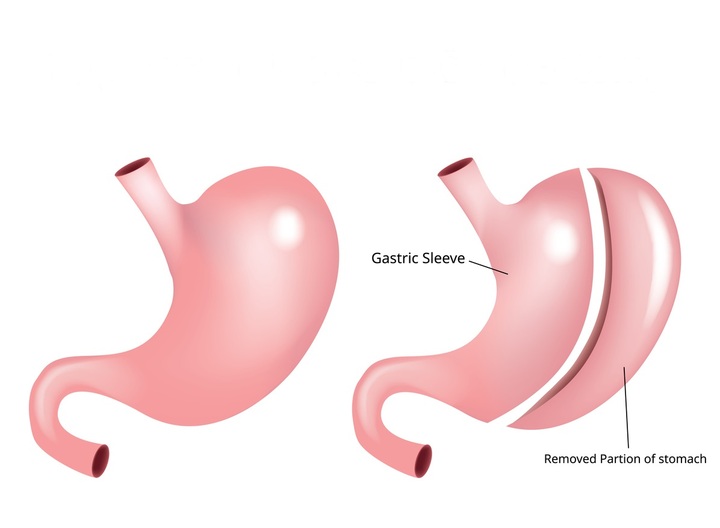Introduction
Gastric sleeve surgery, also known as sleeve gastrectomy, is a surgical procedure that helps individuals struggling with obesity achieve substantial weight loss. In this article, we will delve into the details of Gastric Sleeve Surgery in Dubai, understanding its purpose, the procedure itself, recovery, expected results, and more.
Understanding Gastric Sleeve Surgery
What is Gastric Sleeve Surgery? Gastric sleeve surgery involves removing a large portion of the stomach to create a smaller, sleeve-shaped stomach pouch. This reduction in stomach size restricts the amount of food the individual can consume, resulting in weight loss.

Who is Eligible for the Procedure? Gastric sleeve surgery is typically recommended for individuals with a body mass index (BMI) of 40 or higher, or those with a BMI of 35 or higher with obesity-related health conditions such as diabetes, high blood pressure, or sleep apnea.
Benefits and Risks of Gastric Sleeve Surgery The procedure offers several benefits, including significant weight loss, improvement in obesity-related health conditions, enhanced quality of life, and increased self-confidence. However, like any surgery, it carries potential risks, such as infection, bleeding, blood clots, or leakage from the staple line.
Preparing for Gastric Sleeve Surgery
Before undergoing gastric sleeve surgery, thorough preparation is necessary to ensure a successful outcome. Here are the key aspects of the preparation process:
Medical Evaluation and Tests Medical professionals will evaluate the individual's overall health, perform various tests, and assess their readiness for surgery. This evaluation helps identify potential risks and ensure the procedure is safe for the patient.
Lifestyle Changes Before the Surgery Adopting a healthier lifestyle is crucial before gastric sleeve surgery. Patients are advised to quit smoking, limit alcohol consumption, and make dietary modifications to prepare their body for the upcoming changes.
Pre-Surgery Diet and Exercise A specific pre-surgery diet and exercise plan are typically recommended to help patients lose some weight before the procedure. This reduces the size of the liver, making
it easier for the surgeon to perform the surgery and minimizes the risks associated with an enlarged liver.
The Gastric Sleeve Surgery Procedure
The gastric sleeve surgery procedure is typically performed under general anesthesia and involves the following steps:
Surgical Techniques Used The surgeon will use minimally invasive laparoscopic techniques, which involve making small incisions in the abdomen and inserting specialized surgical instruments and a camera called a laparoscope. This approach reduces scarring, pain, and recovery time compared to traditional open surgery.
Anesthesia and Incisions Once the patient is under anesthesia, the surgeon will create several small incisions in the abdomen to access the stomach. These incisions allow for the insertion of the laparoscope and surgical instruments.
Removal of a Portion of the Stomach The surgeon carefully removes a large portion of the stomach, leaving behind a sleeve-shaped stomach pouch. This new stomach pouch is significantly smaller in size and can hold less food, leading to reduced calorie intake.
Stapling and Sealing the Remaining Stomach To ensure the remaining stomach is sealed and secure, the surgeon uses surgical staples or sutures. This step prevents leakage and allows the stomach to heal properly.
Recovery and Post-Surgery Care
After the gastric sleeve surgery, the patient will typically stay in the hospital for a few days for close monitoring and post-operative care. The recovery process involves the following:
Hospital Stay and Immediate Recovery During the hospital stay, healthcare professionals will closely monitor the patient's vital signs, provide pain management medication, and assist with mobility and initial dietary changes. The medical team will also educate the patient on post-surgery care instructions.
Pain Management and Medication Pain and discomfort are common after gastric sleeve surgery. The healthcare team will prescribe appropriate pain medication to manage any discomfort during the recovery period.
Dietary Changes and Restrictions Following surgery, patients must adhere to a strict diet progression plan that starts with clear liquids and gradually transitions to pureed foods and eventually solid foods. This gradual reintroduction of foods allows the stomach to heal and adjust to its reduced size.
Exercise and Physical Activity Post-Surgery Regular physical activity is essential for successful weight loss and overall health. Patients are encouraged to engage in light exercise as soon as they are cleared by their healthcare provider. However, strenuous activities should be avoided during the initial recovery phase.
Expected Results and Long-Term Effects
Gastric sleeve surgery can lead to significant weight loss and various other positive effects on the patient's health and well-being:
Weight Loss Expectations Most patients can expect to lose a substantial amount of weight in the months following gastric sleeve surgery. On average, individuals may lose 60-70% of their excess weight within the first year.
Improvements in Obesity-Related Health Conditions Weight loss achieved through gastric sleeve surgery often results in improvements or complete resolution of obesity-related health conditions such as type 2 diabetes, high blood pressure, sleep apnea, and joint pain.
Psychological and Emotional Changes Weight loss surgery can have a profound impact on a person's psychological and emotional well-being. Many individuals experience increased self-esteem, improved body image, and reduced symptoms of depression and anxiety.
Maintenance of Weight Loss Maintaining long-term weight loss requires commitment to lifestyle changes. Patients are advised to follow a balanced diet, engage in regular physical activity, attend support groups, and maintain regular follow-up appointments with their healthcare team.